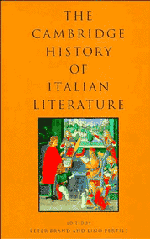Book contents
- Frontmatter
- Origins and Duecento
- The Trecento
- The Quattrocento
- 8 Humanism
- 9 Power, patronage and literary associations
- 10 Literature in the vernacular
- The Cinquecento
- The Seicento: Poetry, Philosophy and Science
- Narrative prose and theatre
- The Settecento
- The Age of Romanticism (1800–1870)
- The Literature of United Italy (1870–1910)
- The Rise and Fall of Fascism (1910–45)
- The Aftermath of the Second World War (1945–56)
- Contemporary Italy (since 1956)
- Bibliography
- References
8 - Humanism
from The Quattrocento
Published online by Cambridge University Press: 28 March 2008
- Frontmatter
- Origins and Duecento
- The Trecento
- The Quattrocento
- 8 Humanism
- 9 Power, patronage and literary associations
- 10 Literature in the vernacular
- The Cinquecento
- The Seicento: Poetry, Philosophy and Science
- Narrative prose and theatre
- The Settecento
- The Age of Romanticism (1800–1870)
- The Literature of United Italy (1870–1910)
- The Rise and Fall of Fascism (1910–45)
- The Aftermath of the Second World War (1945–56)
- Contemporary Italy (since 1956)
- Bibliography
- References
Summary
In modern Italian literary studies, the Quattrocento often appears like Petrarch's personified Philosophy, ‘povera e nuda’: a neglected century compared to her attractive sisters, the Trecento on one side and the Cinquecento on the other. Some of the reasons have to do with the cultural phenomena of the century itself; others with interpretations of the phenomena. To critics for whom a national literature in Italian was and is a top priority, the Quattrocento leaves much to be desired. With the deaths of Petrarch and Boccaccio in 1374 and 1375 respectively, and no one of equal stature to replace them, the ensuing century – roughly 1375 to 1475 – has been seen as a period of literary desolation, a ‘secolo senza poesia’ (a century without poetry), with ‘poetry’ meaning imaginative literature in the vernacular.
According to this view, blame lay in excessive adulation of classical Latin language, letters and values. Poets were replaced by scholars who gave themselves over to imitating a dead literature instead of carrying forwards the newly founded and vigorous one in their own spoken mother-tongue. The educated élite in the Italian peninsula lost confidence in their own culture, and only the invasions of Italy - first by the French in the 1490s and later by Charles V's troops in the 1520s - brought the decadent classicisers to their senses.
- Type
- Chapter
- Information
- The Cambridge History of Italian Literature , pp. 129 - 143Publisher: Cambridge University PressPrint publication year: 1997
References
- 1
- Cited by

